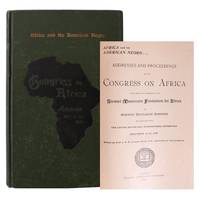1932 · New York
New York: Victor Records, 1932. Very good -. Two bifolia, printed all four sides, one 9” x 6” and the other slightly larger. Very good minus: both with light corner and edge wear, crease at old center fold and evidence of former adhesion to rear; song sheet lightly toned.
This is a pair of rare items from a lesser-known but highly accomplished African American musical group, the Hall Johnson Negro Choir (HJNC). A program for a concert at a Kansas normal school contains a history and reviews of the group, and is accompanied by a packet of choral arrangements and performance notes “especially written for the Choir by Mr. Hall Johnson.”
Per the program here, the HJNC was “composed of genuine down-South Negroes, led by a conductor born and brought up in the center of Georgia, where his grandmother, a former slave, taught him to sing.” Francis Hall Johnson was born in 1888, earned a degree from the South Carolina HBCU Allen University, and also attended Atlanta University, the Juilliard School and the University of Pennsylvania. His older sister taught him to play piano and he taught himself to play violin. He played in professional orchestras until 1925 when he formed the HJNC. The group gained renown for their work on the 1930 Broadway production of The Green Pastures, as well as national and international tours of the play, the 1936 film adaptation, radio and television broadcasts. Johnson arranged music for (and conducted his choir in) more than 30 feature films, including Walt Disney's Snow White and the Seven Dwarfs, Dumbo (for which Johnson and choir also voiced a number of characters) and Song of the South. Johnson died in 1970 and was posthumously inducted into the Black Filmmakers Hall of Fame in 1975.
The present program advertised a HJNC concert at Kansas State Teachers College, which a newspaper ad found online confirmed occurred in 1932. It ran glowing reviews from critics and conductors for performances through 1931 and shared that:
“The Choir consists of sixteen mixed voices, generally nine men and seven women, and their programs include not only spirituals but work-songs, ballads and songs of the levee, the rock-pile and the cotton field, as well as lullabies and songs about animals – the music of the Negro in his lighter moments.”
An accompanying song sheet explained the “general classes” of “Negro spirituals,” along with secular songs and “folk melodies,” and included the lyrics for 20 songs of varied type. Johnson also wrote detailed, poetic performance notes or brief histories for each, highlighting a “hushed, mysterious mood of the refrain,” a “steady, thudding rhythm” and “a tender expression of the beautiful 'hope' of the Negro.”
A rare set of ephemera for an African American choral group, rich with history, notes and reviews. No holdings of either piece were found in OCLC or online. (Inventory #: 8501)
This is a pair of rare items from a lesser-known but highly accomplished African American musical group, the Hall Johnson Negro Choir (HJNC). A program for a concert at a Kansas normal school contains a history and reviews of the group, and is accompanied by a packet of choral arrangements and performance notes “especially written for the Choir by Mr. Hall Johnson.”
Per the program here, the HJNC was “composed of genuine down-South Negroes, led by a conductor born and brought up in the center of Georgia, where his grandmother, a former slave, taught him to sing.” Francis Hall Johnson was born in 1888, earned a degree from the South Carolina HBCU Allen University, and also attended Atlanta University, the Juilliard School and the University of Pennsylvania. His older sister taught him to play piano and he taught himself to play violin. He played in professional orchestras until 1925 when he formed the HJNC. The group gained renown for their work on the 1930 Broadway production of The Green Pastures, as well as national and international tours of the play, the 1936 film adaptation, radio and television broadcasts. Johnson arranged music for (and conducted his choir in) more than 30 feature films, including Walt Disney's Snow White and the Seven Dwarfs, Dumbo (for which Johnson and choir also voiced a number of characters) and Song of the South. Johnson died in 1970 and was posthumously inducted into the Black Filmmakers Hall of Fame in 1975.
The present program advertised a HJNC concert at Kansas State Teachers College, which a newspaper ad found online confirmed occurred in 1932. It ran glowing reviews from critics and conductors for performances through 1931 and shared that:
“The Choir consists of sixteen mixed voices, generally nine men and seven women, and their programs include not only spirituals but work-songs, ballads and songs of the levee, the rock-pile and the cotton field, as well as lullabies and songs about animals – the music of the Negro in his lighter moments.”
An accompanying song sheet explained the “general classes” of “Negro spirituals,” along with secular songs and “folk melodies,” and included the lyrics for 20 songs of varied type. Johnson also wrote detailed, poetic performance notes or brief histories for each, highlighting a “hushed, mysterious mood of the refrain,” a “steady, thudding rhythm” and “a tender expression of the beautiful 'hope' of the Negro.”
A rare set of ephemera for an African American choral group, rich with history, notes and reviews. No holdings of either piece were found in OCLC or online. (Inventory #: 8501)
![Hall Johnson Negro Choir.] (Inventory #: 8501) New York: Victor Records, 1932. Very good -. Two bifolia, printed all four sides, one 9” x 6” an...](https://d3525k1ryd2155.cloudfront.net/h/456/586/1693586456.0.l.jpg)

![Souvenir. 1901-'02. The City of... Houston, Texas [Cover title]](https://d3525k1ryd2155.cloudfront.net/h/073/604/1693604073.0.m.jpg)
